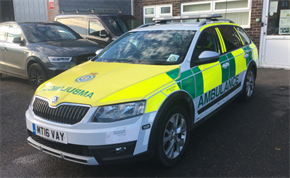
A Rapid Response Vehicle (RRV) based in Fakenham is being trialled to provide faster response times for residents on the North-West Norfolk coast.
Following the implementation and recommendations of the Independent Service Review (ISR) of November 2017, North Norfolk was evaluated as not requiring any Rapid Response Vehicles (RRVs).
This is in line with national guidance which gives preference to sending vehicles that can transport to hospital in the first instance.
The Trust’s sector management team have, however, continued to maintain two RRVs based at Cromer and North Walsham.
Throughout the recent period of increased pressure experienced across the NHS, staff assigned to several RRVs across the Trust’s region have been assigned to Double-Staffed Ambulance (DSA) shifts to increase the number of vehicles with the capability to transport patients.
The Cromer RRV has remained, but staff from the North Walsham RRV have been permanently re-assigned to DSA rotas.
This decision has led to the Trust reflecting on the provision of RRVs across the wider North Norfolk operating area, and whether an alternative location would be more beneficial than remaining in North Walsham.
The Trust is currently planning to conduct a short trial to prove the effectiveness of providing an RRV resource based from Fakenham station.
The trial started last week and will last 12 weeks aiming to identify If there is any demonstrable improvement in response times for North-West Norfolk coastal areas and if patient outcomes improve in the rural areas covered by this trial.
Chief Executive of EEAST, Tom Abell said: “We’ve listened to residents, and I must say that the Norfolk view has been very strongly put across by the local MPs and Councillors on the local Health and Norfolk Health Overview and Scrutiny Committee. We understand their concerns about response times along the North Norfolk coastline and their call for us to invest more.
“There are a number of areas in the EEAST region which are both geographically remote, and also distant from their nearest A&E department. Providing swift responses to these areas with limited resources will always be challenging.
“However, we are part of the region’s Integrated Care System and are committed to its principle of reducing health inequality. Having grown up in Norfolk myself, I am well aware of some of these issues.
“We have retained the use of RRVs in the area and this trial will help us determine how to deliver the best service and the best outcomes for North Norfolk Residents.”
North Norfolk MP Duncan Baker said he welcomed the trial: "Improving ambulance response times in the coastal areas around Wells and the particularly difficult to reach picturesque areas of North Norfolk has been a manifesto cause I have campaigned on ever since my election.
“I am delighted that we have now not only saved the RRVs in North Norfolk but this trial will also focus specifically on improving the life chances in our most rural areas by speeding up our response times.”
Published November 21 2021